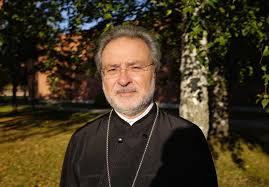
This Post contains small portions from the excellent book In the Heart of the Desert: The Spirituality of the Desert Fathers and Mothers, published here with the generous permission of the author, the Rev. Dr. John Chryssavgis, Archdeacon of the Ecumenical Patriarchate.
I think it’s appropriate reading as we near our annual passage through Great Lent..
Introduction
Society expects its citizens to be active and productive. In society, you are useless if you are not valuable. This expectation translates today into our attitudes towards minorities, or toward the elderly, the disabled, and especially young children. The Desert Fathers and Mothers proclaimed a different set of values, where change occurs through silence and not war; where inaction may be the most powerful source of action; and where productivity may be measured by obscurity, even invisibility…
Nevertheless, just as the desert was a commitment to a counter-cultural way of life, so too prayer is the realization that what matters most is not the success or the achievement or the productivity encouraged by society. Prayer is acceptance of frailty and failure – first within ourselves, and then in the world around us. When we are able to accept our brokenness, without any pretense and without any pretexts, then we are also able to embrace the brokenness of others, valuing everyone else without exception. Prayer is learning to live, without expecting to see the results; it is learning to love, without hoping to see return; it is learning to be, without demanding to have. We cannot live and love and simply be, unless we are consumed by a total commitment to detachment…

It is the clear understanding of these elders that one does not have to move to the geographical location of the wilderness in order to find God. Yet, if you do not have to go to the desert, you do have to go through the desert. The Desert Fathers and Mothers always speak from their experience of the desert, even if they do not actually come out of that desert. The desert is a necessary stage on the spiritual journey. To avoid it would be harmful. To dress it up or conceal it may be tempting; but it also proves destructive of the spiritual path. Ironically, you do not have to find the desert in your life; it normally catches up with you. It may be in the form of some suffering or emptiness or breakdown or breakup or divorce of any kind of trauma that occurs in our life. Dressing this desert up through our addictions or attachments, to material goods or money or food or drink or success or obsessions or anything else we may care to turn toward or may find available to depend upon, will delay the utter loneliness and the inner fearfulness of the desert experience. If we go through this experience involuntarily, then it can be both overwhelming and crushing. If, however, we accept to undergo this experience voluntarily, then it can prove both constructive and liberating.
Some Sayings of the Desert Fathers and Desert Mothers
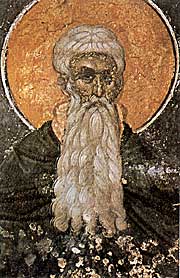
It was said of Abba Arsenius that, just as none in the palace had worn more splendid garments than [he did] when he lived there, so [now] no one in the church wore such poor clothing as he.
One day Abba Arsenius consulted an old Egyptian monk about his own thoughts. Someone noticed this and said to him: “Abba Arsenius, how is it that you, with such good education in Latin and Greek, ask this peasant about your thoughts?” He replied: “I have indeed been taught Latin and Greek, but I do not know even the alphabet of this peasant.”
Some of the fathers questioned Abba Poeman saying: “If we see a brother in the act of committing a sin, do you think that we ought to reprove him?” The old man said to them: “For my part, if I have to go out and see someone committing a sin, I pass on my way without reproving him.”
[Abba Macarius said:] “There is no need at all to make long discourses. It is enough to stretch out one’s hands and to say: ‘Lord, as you will, and as you know, have mercy.’ And if the conflict grows fiercer, just say: ‘Lord, help!’ He knows very well what we need, and He shows us His mercy. And when asked what one should practice, he responded quite simply: ‘Do a good deed. Say a good word!'”
 Amma Syncletica said: “There are many who live in the mountains and behave as if they were in the town; they are wasting their time. It is possible to be a solitary in one’s mind while living in a crowd; and it is possible for those who are solitaries to live in the crowd of their own thoughts.” [She also said:] “Why hate the person who has harmed you? It is not the person who has done the wrong. Hate the sickness, but do not hate the sick person.”
Amma Syncletica said: “There are many who live in the mountains and behave as if they were in the town; they are wasting their time. It is possible to be a solitary in one’s mind while living in a crowd; and it is possible for those who are solitaries to live in the crowd of their own thoughts.” [She also said:] “Why hate the person who has harmed you? It is not the person who has done the wrong. Hate the sickness, but do not hate the sick person.”
It was revealed to Abba Antony [greatest of the Desert Fathers] that there was someone who was his equal in the city. He was a doctor by profession. Whatever he had beyond his needs, he would give to the poor, and every day he sang hymns with the angels.
Abba Antony said to Abba Poemen: “This is the great work of a person: always to take the blame for one’s own sins before God and to expect temptation to one’s last breath.”
Abba Evagrius said: “Take away temptations and no one will be saved.”
Amma Theodora said: “Let us strive to enter by the narrow gate. Just as the trees cannot bear fruit if they have not stood before the winter’s storms, so it is with us. This present age is a storm; and it is only through many trials and temptations that we can obtain an inheritance in the kingdom of heaven.”
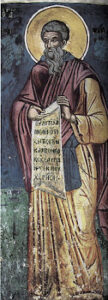
A brother asked Abba Sisoes: “Why did you leave Scetis, where you lived with Abba Or and come to live here?” The old man said: “At the time when Scetis became crowded, I heard that Antony was dead and I got up and came here to this mountain. Finding the place peaceful, I have settled here for a little while.” The brother asked him: “How long have you been here?” The old man replied: “Seventy-two years.”
Abba Poemen said: “Someone may seem to be silent, but if in the heart one is condemning others, then one is babbling ceaselessly. And there may be another who talks from morning till evening, and yet in the heart that person is truly silent. That person says nothing that is not profitable.”
Abba Macarius the Great said to the brothers at Scetis: “Flee, my brothers.” One (of the old men asked him: “Where else could we flee beyond this desert?” Macarius placed his finger on his lips and said: “Flee that!” And he went into his cell, shut the door, and sat down.
One day Abba Longinus questioned Abba Lucius about three thoughts, saying first: “I want to go into exile.” The old man said: “If you cannot control your tongue, you will not be in exile anywhere. Therefore, control your tongue here, and you will be in exile.” Next he said to him: “I wish to fast.” The old man replied: ‘If you bend your neck like a rope or bullrush, that is not the fast that God will accept; but rather, control your evil thoughts.” He said to him the third time: “I wish to flee from people.” The old man responded: “If you have not first of all lived rightly with people, then you will not be able to live properly in solitude either.”
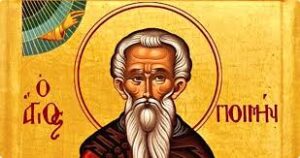 Abba Poemen said of Abba John the Dwarf that he prayed to God to take his passions away from him so that he might become free from care. He went and told the old man about this: “I find myself in peace, without an enemy.” The old man said to him: “Go, beseech God to stir up warfare so that you may regain the affliction and humility that you used to have. For it is by warfare that the soul makes progress.” So he besought God, and when the warfare came, he no longer prayed that it be taken away, but he said: “Lord, give me strength for the fight.”
Abba Poemen said of Abba John the Dwarf that he prayed to God to take his passions away from him so that he might become free from care. He went and told the old man about this: “I find myself in peace, without an enemy.” The old man said to him: “Go, beseech God to stir up warfare so that you may regain the affliction and humility that you used to have. For it is by warfare that the soul makes progress.” So he besought God, and when the warfare came, he no longer prayed that it be taken away, but he said: “Lord, give me strength for the fight.”
- In Orthodox terminology passions are temptations which beset us and threaten to become habitual and take control over us.
Often the blessed Abba Zosimas would say: “We human beings do not know how to be loved and how to be honored.”
Peter, the priest at Dios, ought to have stood in front when he prayed with others, because he was a priest. Yet, because of his humility, he stood behind.

Amma Theodora said that a teacher ought to be a stranger to the desire for domination, vainglory and pride. One should not be able to fool that person by flattery, nor blind that person by gifts… Rather, the teacher should be patient, gentle and humble as far as possible; the teacher must also be tested and be without favoritism, full of concern for others, and a lover of souls.
A brother asked Abba Poemen: “Some brothers live with me; should I be in charge of them?” The old man said to him: “No, just work first and foremost. And if they want to live like you, then they will see to it themselves.” The brother said to him: “But it is they themselves, Father, who want me to be in charge of them.” The old man replied: “No, be their example, not their legislator.”
Abba Theophilus, the Archbishop [of Alexandria], came to Scetis one day. The brothers who were assembled said to Abba Pambo: “Say something to the archbishop so that he may be edified.” The old man said to them: “If he is not edified by my silence, then he will not be edified by my speech.”
Abba Zosimas always liked to say: “It is not possessing something that is harmful, but being attached to it.”
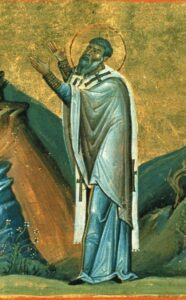
Abba Lot went to see Abba Joseph and said to him: “Abba, as far as I can, I say my little office *, I fast a little, I pray and meditate, I live in peace and, again as far as I can, I purify my thoughts. What else can I do?” Then, the old man stood up and stretched his hands toward heaven. His fingers became like ten lamps of flame, and he said to him: “If you really want, you can become all fire.”
- the monastic prayer services appointed for various times of day
Like a god upon this earth, Abba Macarius would cover the faults of others, which he saw, as though he did not see them; and those which he heard, as though he did not hear them.
A brother who had sinned was turned out of the church by the priest. Abba Bessarion got up and went out with him, saying: “I too am a sinner.”
One day Abba Isaac went to a monastery. He saw a brother committing a sin and condemned him. When he returned to the desert, an angel of the Lord came and stood in front of the door of his cell, and said: “I will not let you enter.” But he persisted saying: “What is the matter?” The angel replied: “God has sent me to ask you where you want to throw the guilty brother whom you have condemned.” Immediately he repented and said: “I have sinned; forgive me.” Then the angel said: “Get up, God has forgiven you. But from now on, be careful not to judge someone before God has done so.”
Abba Nilus said: “Everything that you do in revenge against a brother who has harmed you will come back to your mind at the time of prayer.”
Abba Poemen said that a brother who lived with some other brothers asked Abba Bessarion: “What ought I to do?” The old man said to him: “Keep silence, and do not always be comparing yourself with others.”
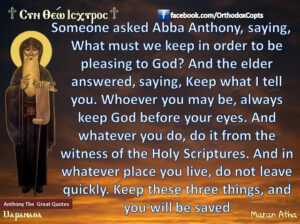
Abba Antony said: “Our life and our death is with our neighbor. If we gain our brother, then we have gained God; but if we scandalize our brother, then we have sinned against Christ.”
Some of the elders came to Abba Poemen and asked him: “When we see brothers who are falling asleep during the services, should we arouse them so that they will be watchful?” Poemen was like Antony; he too had reached the point of love. He was not anxious about not achieving some ascetic end. He said to them in response: “For my part, when I see a brother falling asleep, I place his head on my knees and let him rest.”
Abba Apollo said: “When you see your brother, you have seen the Lord your God.”
The Rev. Dr. John Chryssavgis, Archdeacon of the Ecumenical Throne, was born in Australia. He studied theology at the University of Athens and Byzantine Music at the Greek Conservatory of Music. He completed his Ph.D. at the University of Oxford. After spending time on Mt Athos, he served as Personal Assistant to Archbishop Stylianos in Australia, where he co-founded St Andrew’s Theological College and taught at the University of Sydney. In June 2023 he was appointed the first Executive Director of the Huffington Ecumenical Institute at Hellenic College/Holy Cross Greek Orthodox School of Theology in Brookline, Massachusetts. He will also rejoin the Holy Cross faculty, of which he was a member from 1995-2002, as Professor of Theology. He currently serves as theological advisor to the Ecumenical Patriarch.
The book In the Heart of the Desert is available from many sources, ranging from Amazon to Walmart!
Next Week: What is forgiveness? Maybe not what you think.
Week after Next: The Sunday of Orthdoxy – the True Church?